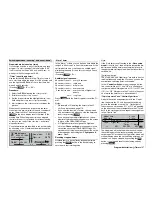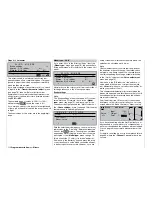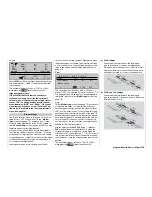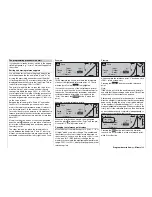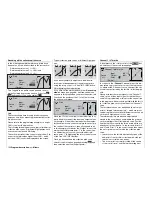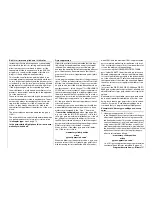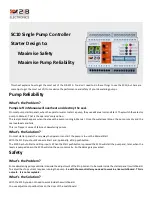
114
Program description:
Mixers
Flaps 6
3 elevator
SYM
ASY
Brake settings
Aileron
=>
2–>4 rudder
0%
Flaps
6–>3 elevator
0%
0%
Elevator 3–>6 flaps
0%
0%
W I N G M I X E R S
This mixer is used to set elevator (pitch-trim) com-
pensation when a fl ap command is given. It is typical-
ly used to adjust the model’s airspeed automatically
when the fl aps are lowered.
If you have assigned a transmitter control or a switch
to Input 6 in the »
Transmitter control adjust
« menu
(see page 78), then it will also affect this mixer.
Symmetrical or asymmetrical settings relative to the
neutral point of the fl ap control are possible by selec-
ting
SYM
or
ASY
.
The available range of values is -150% to +150%,
while pressing
CLEAR
resets the value to 0%.
If you assign a switch to this function in the right-hand
column, you will be able to switch the mixer on and off
in fl ight.
The usual values for this mixer are in the single-digit
range.
Model type: “2 AIL”
If you enter “2 AIL” in the “Ailerons / fl aps” line of the
»
Model type
« menu (see page 70), the transmitter’s
“Wing mixer menu” will look similar to the screen-shot
below:
«Normal »
Brake settings
Aileron
=>
2–>4 rudder
0%
3–>5
Elevator
0%
0%
Aileron differential
0%
aileron
W I N G M I X E R S
A brief press on the rotary control from the fi rst line of
this page takes you to the following sub-menu …
Brake settings
Note:
The “Brake settings” menu is switched “off” if you en-
tered “Motor on C1 forward / back” in the »
Model
type
« menu (see page 70), and leave “yes” for the
currently active fl ight phase in the “Motor” column of
the »
Phase settings
« menu (see page 100). You may
therefore need to switch fl ight phases:
AILE
Crow
B R A K E S E T T I N G S
Elevat. curve
Diff. reduct.
0%
0%
=>
With the selected model type you can now enter sui-
table values in the “Crow” and “Differential reduction”
lines for the
AILE
column. These options should be
exploited by fi rst moving the “brake” control (see the
description of the »
Model type
« menu on page 70;
this is usually the C1 stick) to its “brake” end-point.
Now move to the “Butterfl y” line and press the rotary
control briefl y: set a value which causes the ailerons
to defl ect up as far as possible. However, if you are
using conventional airbrakes as the main brake, the
up-defl ection should be much lower.
Note:
Check whether the servos strike their end-stops at
the extremes of travel; if they do, the stalled servos
will draw a very heavy current. You can reliably pre-
vent this happening by setting a suitable limit value
in the “-Limit+” column of the »
Servo adjustment
«
menu (see page 74).
Now move to the “Diff. reduction” line and set a %-
value which is the same as or larger than the (aile-
ron) differential which you set one screen “earlier” (or
which you are about to set).
This suppresses differential aileron travel when the
brakes are deployed, and should ensure that you still
have adequate aileron response when the ailerons
are raised for braking.
From the bottom line (“Elev. curve”) of the screen a
brief press on the rotary control takes you on to the
screen where the “Brake
elevator” mixer is set up.
-
-7%
m
OU
T
P
U
T
--
+
10
0
1
-7%
-19%
Brake
Input
Output
off
Elevator
Point
Curve
1
If you have the feeling after the fi rst fl ight that you al-
ways needed to use up-elevator to compensate for a
pitch trim change when the airbrakes were extended,
you can program an automatic elevator mixer at this
point.
For details on setting up a curve mixer please refer to
page 90, where the »
Channel 1 curve
« mixer is dis-
cussed.
Summary of Contents for mx-24s
Page 1: ...1...
Page 19: ...19 For your notes...
Page 35: ...35 For your notes...
Page 41: ...41 41 For your notes...
Page 57: ...57 For your notes...
Page 63: ...63 63 For your notes...
Page 69: ...69 69 For your notes...
Page 85: ...85 85 For your notes...
Page 99: ...99 For your notes...
Page 143: ...143 For your notes...
Page 191: ...191 For your notes...
Page 212: ...212 212 For your notes...
Page 213: ...213 213 For your notes...
Page 214: ...214 For your notes...
Page 216: ...216...








